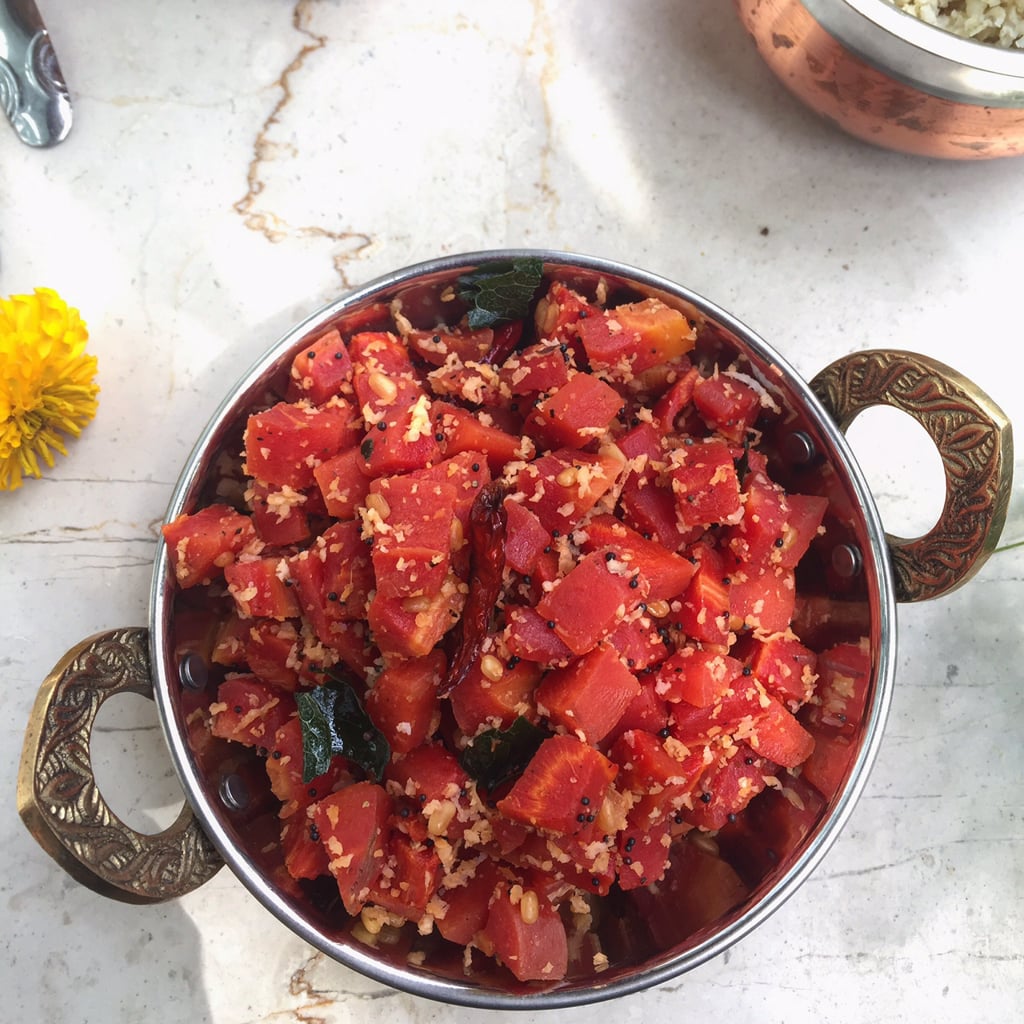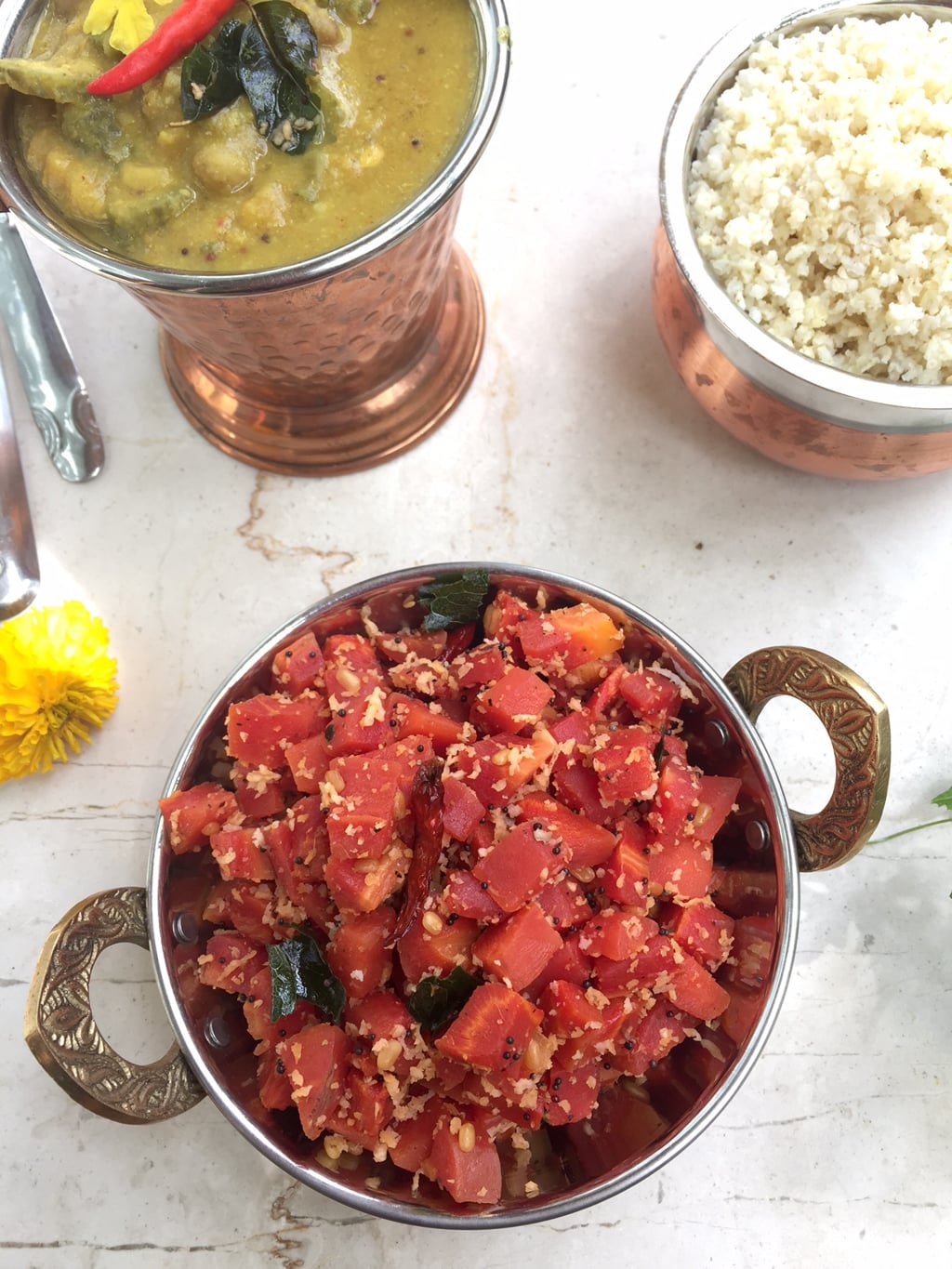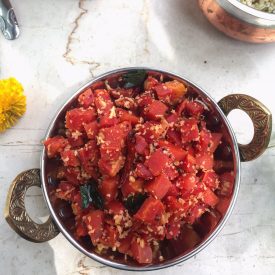

Recipe for a simple Tamil home-style carrot curry or poriyal
Before you think there’s a discrepancy between the photo and the title of the recipe, a ‘curry’ or ‘kari’ in Tambrahm cooking pretty much means a stir fry. While restaurants call it ‘poriyal’ I have never heard anyone at home use this term. It’s always called a curry.
Bhindi curry, cabbage curry, beans curry – they are all prepared in a similar manner. Vegetables like carrot, beetroot and beans are diced/sliced, steamed and then added to a standard tempering and garnished with fresh coconut. Vegetables like lady’s finger and cabbage (cabbage poriyal recipe) are cooked in the pan along with the tadka as they are delicate enough to cook quickly in the pan itself.
Other dry curries like potato, colocassia are first cooked, then diced and pan fried in slightly more oil so that their outer layer becomes golden and crisp. This is one thing that everyone at dinner fights over – the crispy bits.

While carrot curry or poriyal does not have the tempting crispy layer, it is the most comforting accompaniment to a spicy rasam or a mildly bitter Pavakka Pitla and rice. This is another dish I totally disliked as a kid, along with beetroot curry, that I am growing to love as an adult. The garnish of fresh coconut just makes everything taste so much better. Feel free to ignore this if you are one of the people who dislikes coconut though, this is just my South Indian genes expressing itself.
This recipe is another example of how minimalistic most Tambrahm cooking is. The focus is steady on the flavour of the vegetable itself, without addition of any strong aromatics like ginger, garlic or onions. It is also one of the easiest kind of recipes to master, as it requires barely a handful of ingredients and the only skill needed here is not to overcook the veggie and to do the tadka / tempering just right. (read as don’t burn the udad dal, but don’t leave it white either)
The same recipe can be prepared with a mix of carrot-cabbage-French beans, all finely chopped, added to the tempering, and steam cooked in the pan itself with regular sprinkles of water.
So, if you are a beginner, this one recipe is a guaranteed success.


Carrot Curry / Carrot Poriyal
Ingredients
- 400 grams Carrots / 3 No.
- 1/2 tsp Salt
- 1 tbsp coconut oil Edible
- pinch Asafoetida
- 1/2 tsp Mustard seeds
- 1 tbsp dal Split udad
- sprig Curry leaves
- 2 red chilli Dried
- 3 - 4 tbsps coconut Fresh grated
Instructions
- Peel and dice the carrots, roughly 1.5 cm sized cubes. This recipe uses Red Carrots as they are in season. The same recipe works perfectly well with orange/Ooty carrots available round the year.
- In a container that fits in the pressure cooker, place the diced carrots, tossed in salt with 3-4 tbsp of water.
- Pressure cook for 1 whistle and then on sim for 10 minutes. Open the cooker when cool enough to handle, remove the carrots, drain any excess water. Use this in sambar / rasam or dal, do not discard this water.
- In a heavy bottomed pan, heat the coconut oil. Add a pinch of asafoetida and mustard seeds. Once the mustard seeds splutter, add the udad dal. Stir on high flame until the udad dal turns golden brown. Add the curry leaves, dried red chillies and quickly stir. The leaves and chillies will crisp up.
- Add the diced and cooked carrot, toss gently, until the tempering coats the carrots. Check for salt and adjust accordingly.
- Garnish with fresh coconut and remove into a serving bowl.
- Serve hot with rice and rasam or sambar.






could you pls reconfirm if the water in Step 2 is 3-4 tbsp pls? thanks
could you reconfirm if the water in step 2 is 3-4 tbsp pls?
Yes
Simple & tasty!